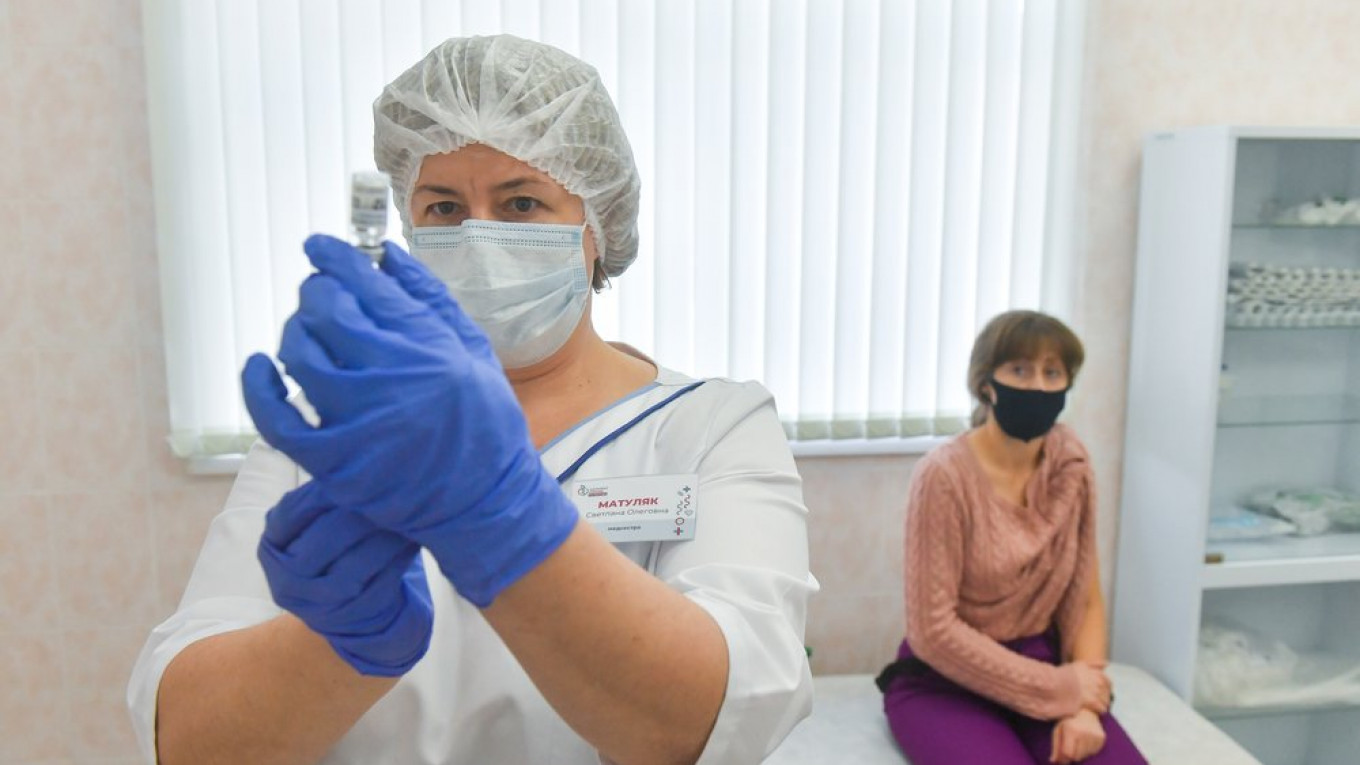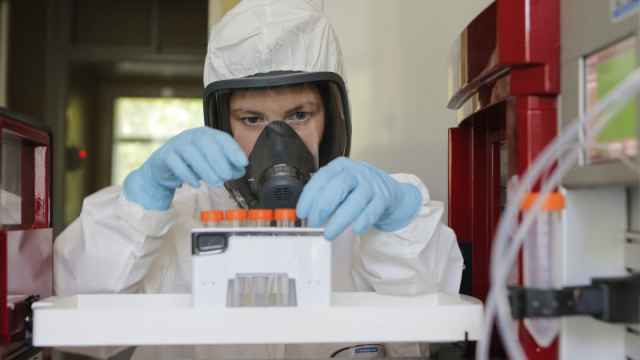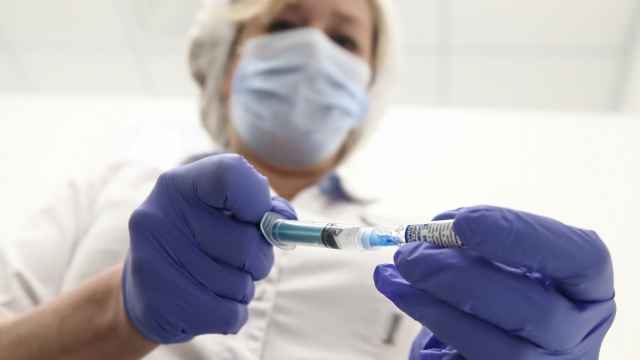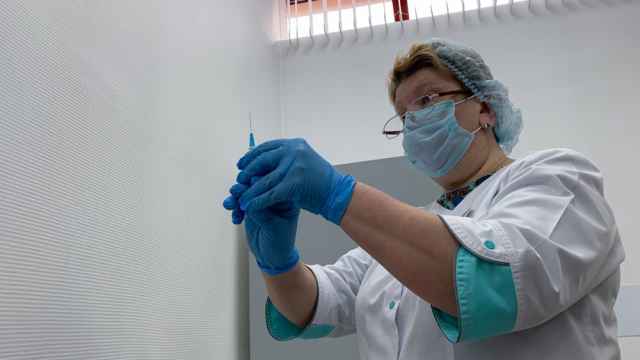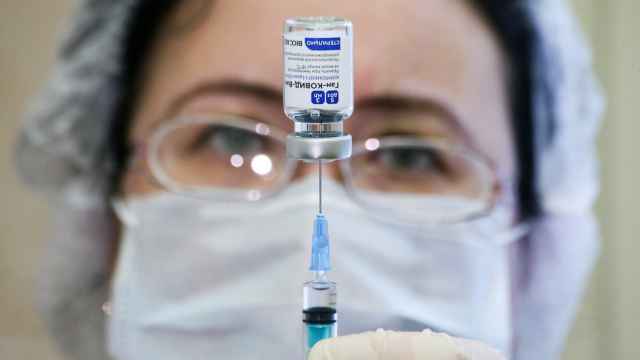As a teacher at a large school in Moscow’s southern suburbs, Nina Zhukova should have been one of the first to receive the Sputnik V coronavirus vaccine being offered to priority workers across the Russian capital.
Instead, having already contracted and recovered from the virus in the autumn, Zhukova is determined not to be vaccinated.
“I wouldn’t get vaccinated even if I hadn’t had Covid,” she told the Moscow Times.
“I’m just not a big believer in Russian medicine.”
Zhukova isn’t alone in her skepticism toward Russia’s anti-coronavirus campaign. Though Sputnik V, the first coronavirus vaccine in the world to receive regulatory approval, has demonstrated an impressive 91.2% efficacy, widespread public distrust of the vaccine’s development process means take-up remains low.
The Moscow Times has previously reported that Moscow doctors are unwilling to receive a vaccine many regard as unproven, with regulatory approval granted based on test results from much smaller groups of volunteers than is standard, and before the completion of Phase III trials. Scenes from clinics across the capital two weeks into the mass vaccination program indicate that other workers eligible for the jab feel the same.
So far, the mass rollout of Russia’s vaccine that began on Dec. 4 has been aimed at key workers in certain government-designated sectors, with initial access to the inoculation limited to medics, social workers and teachers.
Though the vaccine is still off-limits to the over-sixties, the range of eligible recipients has since been progressively widened to include cultural, manufacturing and retail workers as well as municipal employees, transport staff and journalists. Jabs are now underway in all of Russia’s 85 regions.
Even so, the precise number of Russians to have received the vaccine is unknown.
On Dec. 10, Alexander Gintsberg, head of the Gamaleya Institute, which developed Sputnik V, told state television that over 150,000 people had already received the vaccine nationwide, the most in any country in the world.
However in Moscow — the first Russian city to embark on a major vaccination push — the true picture remains unclear.
Five days into the capital’s vaccination campaign, Moscow mayor Sergey Sobyanin — who has said the city will have to inoculate between six and seven million residents over the coming months — announced that over six thousand people had received Sputnik V.
With 70 specialist clinics across the capital administering the vaccine, Sobyanin’s words suggested an average of only 17 people per day receiving the vaccine at each clinic. That compares with 130,000 reportedly vaccinated in the first week of the UK’s equivalent anti-coronavirus campaign.
In a subsequent update on Dec. 16 — eleven days into the vaccination program — Sobyanin told lawmakers on Moscow City Council that 12,000 Muscovites had been vaccinated in total, a figure that implies a further drop in the city-wide vaccination rate to 1000 patients receiving Sputnik V daily, equating to as little as 14 per clinic.
The Health Ministry has recently announced that foreign citizens resident in Russia may receive the vaccine, possibly hinting at lower-than-expected uptake among Muscovites, to whom the vaccine was initially limited.
At six Moscow coronavirus vaccination clinics visited by The Moscow Times Wednesday, ranging from those serving the city’s outer suburbs to the affluent districts around the Kremlin, the situation was mixed.
As would-be recipients are required to pre-register for the vaccine online, queues for Sputnik V are rare, with most patients visiting the clinics for reasons other than the coronavirus.
Though some clinics reported large demand for the vaccine as mass inoculation of Interior Ministry employees has begun, at several medical centers staff members spoke of difficulties finding enough patients willing to be vaccinated.
At one branch of City Polyclinic No. 3, which serves much of central Moscow across several different sites, staff reported especially low uptake of the vaccine.
“Even on a good day, we don’t get more than ten people,” said an administrator overseeing coronavirus vaccination at the clinic branch, who spoke under condition of anonymity.
Sputnik V — which is transported in packs of five doses and must be kept frozen at minus 70 degrees celsius — is generally administered to groups of five patients at a time, as each five-dose packet can only be defrosted for one hour before becoming unusable.
According to documents seen by The Moscow Times, on at least one day the clinic branch had only registered four patients willing to receive the vaccine, meaning the leftover fifth dose might have to be thrown away.
Underlying distrust
Above all, Sputnik V’s struggles at home reflect the Russian public’s underlying distrust of the healthcare system.
Overseas, over fifty countries have so far asked to buy or produce Sputnik V, while UK pharmaceutical giant AstraZeneca is exploring the possibility of combining the Russian vaccine with its own.
However, in Russia itself reactions have been decidedly cooler.
“There is a generally disoriented atmosphere in Russian society. People don’t really trust the news when it comes to the virus,” said Alexei Levinson, director of the Socio-Cultural Research Department of the Levada Center independent pollster.
According to an October survey conducted by Levada, 59% of respondents would not take a free coronavirus vaccine. An earlier poll taken in August showed only 13% of those questioned expressing trust in Sputnik V.
More recent polling, conducted in December by the Public Opinion Fund, a government-linked pollster, has support for the vaccine on the rise, with 42% signalling willingness to receive the jab, even as a 52% majority of respondents remain reluctant to take Sputnik V.
Unfounded claims
Although Levinson believes that Russians’ skepticism toward the vaccine has deep roots, with many Russians instinctively preferring foreign-made medicines, the situation has been further exacerbated by the growth of anti-vaccine material online, which has exploded in popularity since the beginning of the pandemic.
“There is no basis for vaccination in Russia,” said Irina Yermakova, a biologist whose videos spreading unfounded claims that Sputnik V — and vaccines in general – are ineffective and possibly dangerous have been viewed hundreds of thousands of times on YouTube and Russia’s largest social network VKontakte.
“They are hiding information about the nature of the virus. Until we know more, I won’t trust any vaccine,” she said.
According to Alexandra Arkhipova, an anthropologist at the Russian Presidential Academy of National Economy and Public Administration who studies the spread of conspiracy theories, rumours about the coronavirus vaccine’s negative side effects began to surge online on Dec. 3 — the very same day Moscow’s mass vaccination program was announced.
“Most popular of all is the rumour that by taking the vaccine, you’ll actually get sick yourself,” said Arkhipova.
Daniil Galaydov contributed reporting.
A Message from The Moscow Times:
Dear readers,
We are facing unprecedented challenges. Russia's Prosecutor General's Office has designated The Moscow Times as an "undesirable" organization, criminalizing our work and putting our staff at risk of prosecution. This follows our earlier unjust labeling as a "foreign agent."
These actions are direct attempts to silence independent journalism in Russia. The authorities claim our work "discredits the decisions of the Russian leadership." We see things differently: we strive to provide accurate, unbiased reporting on Russia.
We, the journalists of The Moscow Times, refuse to be silenced. But to continue our work, we need your help.
Your support, no matter how small, makes a world of difference. If you can, please support us monthly starting from just $2. It's quick to set up, and every contribution makes a significant impact.
By supporting The Moscow Times, you're defending open, independent journalism in the face of repression. Thank you for standing with us.
Remind me later.



